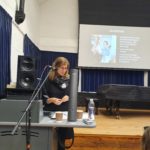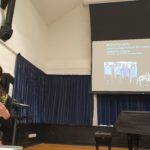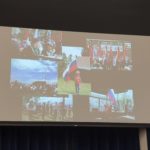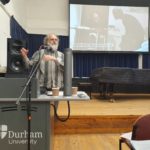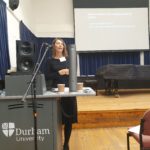Projektna skupina se je udeležila XXXV srečanja Evropskega seminarja etnomuzikologov “Uprizarjanje telesa” (“Performing Bodies”), ki je potekalo v času od 3-7 September 2019, na Oddelku za glasbo, Durham University, UK.
Izledke svojih raziskav so predstavili na skupnem panelu “Sounds, Bodies and Affects in Music Performing and Listening,” ki ga je vodil Martin Stokes, Kings College London.
Participants:
Alenka Bartulović
University of Ljubljana, Department of Ethnology and Cultural Anthropology, e-mail: alenka.bartulovic@ff.uni-lj.si
The Affectivity of Sevdalinka in Post-Yugoslav Slovenia
Anthropological, sociological and ethnomusicological studies of music-making in Slovenia have predominantly focused on musical expression of recognized migrant and diasporic communities, whereas there is still a lack of analysis of artistic practices in the context of transit or temporary migrations. Such research is also often marked by a presumption that cultural production of temporary migrants and refugees is characterized by relatively limited interaction with the local milieu. Yet, ethnographic example, which analyses different musical practices of Bosnian refugees in post- Yugoslav Slovenia in the 1990s, aims to challenge these assumptions, and explores the specific material, but also social conditions of music-making in exile.
The article calls for more contextualized exploration of different contexts of migration and the conditions that enable stronger cooperation between refugees and locals. In particular, the article explores the effects and affects of the common Yugoslav history as a crucial part of the common legacy that enabled popularization of the Bosnian refugee music groups as well as specific musical genre – sevdalinka in Slovenia. The paper therefore focuses on experiences of Slovenian public that embraced refugees’ groups, in particular band Dertum and ethnographically traces the narratives of the embodied experiences of younger audience, fans of the musical group, who used their fandom also as a part of resistance towards the increased nationalization of the former Yugoslav societies in the 1990s.
Mojca Kovačič
Institute of Ethnomusicology, Research Centre of Slovenian Academy of Sciences and Arts
Experiencing political atmosphere through collective singing
The paper deals with the case study of amateur choir “Zora Janče”, which, together with the repertoire (partisan songs and songs of resistance) and participation in politically oriented events or thematic concerts co-shapes the political community based on the memory of the Second World War. On the other hand, study reveals the pragmatism of the anticipation of certain members of the choir in participating in such events, since the choir is also a cultural entity of a certain (politically determined) region.
The study will set the musical performance of the choir in the post-Yugoslav socio- political framework as the influential context for embodied music interactions.
In addition, through the (auto) ethnographic approaches and analysis of musical performances subjective and experiential aspect in shaping collective political expressions will be analyzed in a more detailed way. Within this, following questions will be addressed: questions of atmospherical manifestation of meaningfulness (Abels 2018), the comparison of musical embodiment of different musical pieces, the interaction, synchronization or affective potential of the collectivity (audience and performers), and the research of the mobilization potential of certain repertoires performed.
Ana Hofman
Institute of Cultural and Memory Studies, Research Centre of Slovenian Academy of Sciences and Arts
“Our Bodies Shuddered”: Affect, Voice and Embodiment in Mass Singing of the Post- Yugoslav Activist Choirs
This panel explores the embodied experiences of live music performing and listening in various performances settings in the context of post-Yugoslav societies. Grounded in the ethnographic approach, it demonstrates how performers and listeners (also including the voice of the ethnographer) narrate their embodied experiences of sonic- related experience. The central concept we use to define the “experiential messiness” (Ahmed 2004) that is placed in the interrelation within the social and the somatic is the concept of transmission of affect by Theresa Brennan (2003), as both discursive and sensory category used to capture the circulation of embodied experience of music performing and listening. Particular attention is given to the in-depth analysis of ethnographic data and narratives of sonically-mediated affective exchange in the light of culturally-specific modes of sensory perception.
The first paper focuses on the affectivity on the genre of sevdalinka as performed by migrant and diasporic communities in post-Yugoslav Slovenia. Building its approach on the ethnographic exploration of the collective signing of the rural-based choir “Zora Janče,” second paper explores affective atmospheres as related to the sonic reactualization of the antifascist resistance during WWII in Slovenia. The third paper takes a space-related approach in order to discuss the histories and effects spaces of performance have on sonic and bodily performance. The final paper deals with political affect as mediated through collective singing that is used as a sensorial rupture in the political atmosphere of apathy and exhaustion in by activists in the post-Yugoslav cities.
Rajko Muršič
University of Ljubljana, Department of Ethnology and Cultural Anthropology, e-mail: rajko.mursic@ff.uni-lj.si
Performing space, body and sounds: Autoethnography of improvised music and dance performance
The author will reflect his own experience on three occasions he improvised with the butoh dancer Ryuzo Fukuhara. The first one was an accidental performance at a barn where the annual festival “Bučna” (noisy/pumpkin) was organised. It happened that the most profane rural place provided an extraordinary atmosphere for oceanic (or cosmic experience) of the performers – at least we reflected our experience that way after the performance.
The second one was a performance at the conference on touch in theatre, which was actually considered a paper given at the conference. The space of the performance provided an opportunity to play with various realities of experience at the same time (or, if you like, ontologies), ultimately restoring paramount reality at the very end. The third performance was organised in the Celica venue, which used to be a side-part of the famous Ljubljana squat Metelkova City, but was a year ago incorporated into the Ljubljana municipality public enterprise. The performance was organised to support an independent organiser of cultural events. The only parameter the performers agreed before the performance was to provide 49 minutes, which actually happened.
The author will discuss spaces of performance; their histories and effects these venues have on sonic and bodily performance. Are sounds and body movements in dance, as well as various sounds provided by the dancer’s body and vocal cords, the result of pure intuitive movements and spontaneous imagination of a musician and a dancer, or are they the result of their complex relationship incorporating space (a venue), the audience and other factors?


